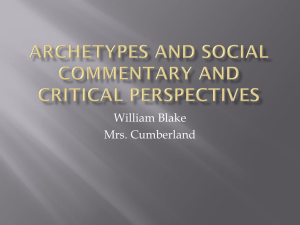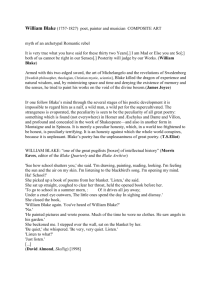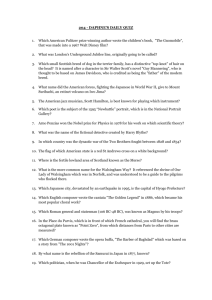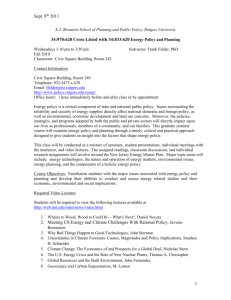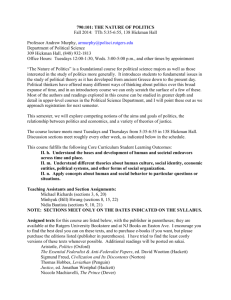790:318:80 - Rutgers University
advertisement
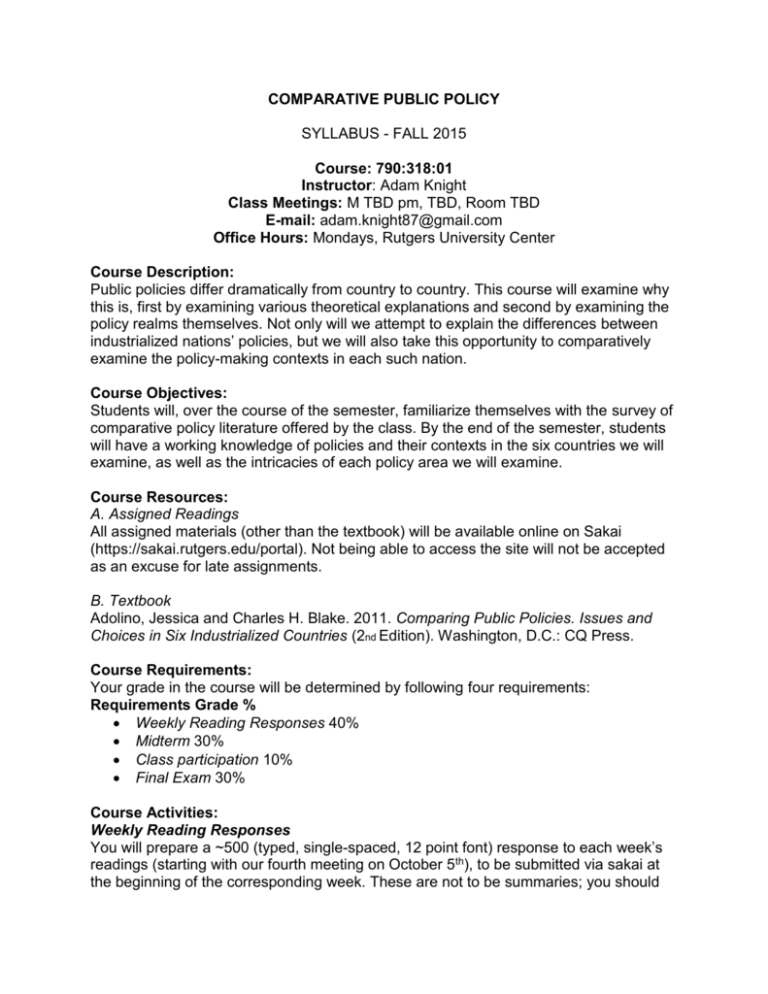
COMPARATIVE PUBLIC POLICY SYLLABUS - FALL 2015 Course: 790:318:01 Instructor: Adam Knight Class Meetings: M TBD pm, TBD, Room TBD E-mail: adam.knight87@gmail.com Office Hours: Mondays, Rutgers University Center Course Description: Public policies differ dramatically from country to country. This course will examine why this is, first by examining various theoretical explanations and second by examining the policy realms themselves. Not only will we attempt to explain the differences between industrialized nations’ policies, but we will also take this opportunity to comparatively examine the policy-making contexts in each such nation. Course Objectives: Students will, over the course of the semester, familiarize themselves with the survey of comparative policy literature offered by the class. By the end of the semester, students will have a working knowledge of policies and their contexts in the six countries we will examine, as well as the intricacies of each policy area we will examine. Course Resources: A. Assigned Readings All assigned materials (other than the textbook) will be available online on Sakai (https://sakai.rutgers.edu/portal). Not being able to access the site will not be accepted as an excuse for late assignments. B. Textbook Adolino, Jessica and Charles H. Blake. 2011. Comparing Public Policies. Issues and Choices in Six Industrialized Countries (2nd Edition). Washington, D.C.: CQ Press. Course Requirements: Your grade in the course will be determined by following four requirements: Requirements Grade % Weekly Reading Responses 40% Midterm 30% Class participation 10% Final Exam 30% Course Activities: Weekly Reading Responses You will prepare a ~500 (typed, single-spaced, 12 point font) response to each week’s readings (starting with our fourth meeting on October 5th), to be submitted via sakai at the beginning of the corresponding week. These are not to be summaries; you should be taking a critical look at the material. Please be sure to cover all of the readings for each week, but feel free to focus on a particular reading or element in a particular reading. Please be sure to see me during office hours or email me if you have questions about the weekly reading responses. Midterm The midterm for the course will consist of a set of identification prompts as well as short essays. The test will be administered through sakai, so you may use your notes as you see fit. Bear in mind, though, that each section will be timed, so you will not, for instance, have enough time to look up terms for the ID section as you go. You will not be allowed to retake the midterm unless you have a legitimate documented excuse. Final Exam The final exam will consist entirely of essay questions similar to those on the midterm. It will also be administered via sakai. Course Policies: Students are responsible for all assigned readings and homework assignments prior to class and are expected to participate in class activities. The assigned readings are the basis for understanding each class session. All assignments are subject to be changed at the discretion of the professor. Students are expected to arrive on time for class and remain for the full period. Coming in late and leaving early disrupts the class. Excessive absence may result in a failing grade. Students may excuse themselves if they absolutely must, but habitually leaving class will result in a negative effect on one’s grade. The instructor reserves the discretion to reduce a student’s final grade by a full letter if a student habitually breaks course policies. Student Communication I will be available to talk with you anytime during my office hours or upon appointment. Please do not hesitate to contact me by email to schedule a meeting. If you experience a legitimate emergency which will prevent you from completing required coursework on time, I expect you to communicate with me at the earliest reasonable opportunity. Please state the nature of the emergency, and when you expect to turn in the coursework. Policies: Attendance Given that the class meets only weekly, I am placing special emphasis upon attendance. Any absence beyond the first will result in a penalty of three percentage points taken off of the total grade for the class. I will not be giving excused absences after the fact. Any and all absences must be explained beforehand in order to be excused, and any explanation short of a genuine crisis will not be accepted. I understand that sometimes minor incidents cause students to miss class, but that is why the first absence does not count. Academic Integrity Students should acquaint themselves with the college policy on plagiarism. Full text of the Interim Academic Integrity Policy available at: http://academicintegrity.rutgers.edu/integrity.shtml. Students are also advised to refer to the Office of Student Conduct website: http://studentconduct.rutgers.edu/ Special Needs Any student who feels s/he may need an accommodation based on the impact of a disability should contact me privately to discuss your specific needs and contact the Office for Disability Services. Also, students are also strongly encouraged to speak with the instructor whenever there is a problem. If family or work obligations, or any other extenuating circumstance threatens to interfere with the student's attendance or his/her completion of the course work, the student should notify the instructor as soon as possible. IDEAS FOR STUDENT TOPICS: Policy on Abortion Policy on Capital Punishment "Political Reform" (how nations try to keep politics `clean') Higher Education Policy Regulatory Policy (e.g. of Telecommunications) Narcotics Regulation (Drug Policy) Anti-Trust Policy Labor Policy COURSE OVERVIEW: 9/14 – Introduction Syllabus Adolino and Blake Ch. 1 9/21 – Theory *Adolino and Blake: ch. 2 *Paul A. Sabatier, “The Need for Better Theories,” Theories of the Policy Process, ed. Paul A. Sabatier pp. 3-13 *Nikolas Zahariadis “The Multiple Streams Framework,” Theories of the Policy Process, ed. Paul A. Sabatier pp. 65-92 9/28 - Social Coalitions and Institutions *Sven Steinmo, "Political Institutions and Tax Policy in the United States, Sweden, and Britain," World Politics 41 (July 1989): 500-535. *James L. True, Bryan D. Jones, and Frank M. Baumgartner, “Punctuated Equilibrium Theory” Theories of the Policy Process, ed. Paul A. Sabatier pp. 155-187 10/5 – Ideas and Social Construction *John L. Campbell, “Institutional Analysis and the Role of Ideas in Political Economy,” Theory and Society 27:3 (1998), pp. 377-409. *Helen Ingram, Anne L. Schneider, and Peter Deleon, “Social Construction and Policy Design,” Theories of the Policy Process, ed. Paul A. Sabatier pp. 93-121 10/12 – Political Economy and the Policy-Making Context *Adolino and Blake: chs. 3-4 10/19 – Midterm 10/26 – Anti-Poverty and Family Policy *Kimberly Morgan, “The Politics of Mothers’ Employment: France in Comparative Perspective,” World Politics 55 (January 2003), pp. 259-289. *Patricia Boling, “Demography, Culture, and Policy: Understanding Japan’s Low Fertility,” Population and Development Review 34:2 (2008), pp. 307-326. 11/2 – Social Policy and Pensions *Adolino and Blake: ch. 9 *Karen M. Anderson, "The Politics of Retrenchment in a Social Democratic Welfare State: Reform of Swedish Pensions and Unemployment Insurance,” Comparative Political Studies 34:9 (November 2001): 1063-1091. 11/9 – Immigration Policy *Adolino and Blake: ch. 5 *Amy Gurowitz, "Mobilizing International Norms: Domestic Actors, Immigrants, and the Japanese State," World Politics 51: 3 (1999): 413-445. 11/16 – Fiscal Policy *Adolino and Blake: ch. 6 *Thomas Piketty Capital in the Twenty-First Century, 2014, pp. 571-577 “Thomas Piketty’s ‘Capital’ summarized in four paragraphs” http://www.economist.com/blogs/economist-explains/2014/05/economist-explains Bill Gates, “Why Inequality Matters”http://www.gatesnotes.com/Books/Why-InequalityMatters-Capital-in-21st-Century-Review 11/23 – Taxation *Adolino and Blake: ch. 7 George M. Guess and Paul G. Farnham Cases in Public Policy Analysis, third edition, 2011, pp. 239-274 11/30 – Healthcare Policy *Adolino and Blake: ch. 8 *Andre Picard, “Is Obama’s Law a Healthcare Revolution?” Globe and Mail, March 25, 2010, p. L1. http://www.theglobeandmail.com/life/health-and-fitness/is-obamas-law-ahealth-care-revolution-meh/article1369619/ *Jonathan Oberlander, “Long Time Coming: Why Health Reform Finally Passed,” Health Affairs 29:6 (2010), pp. 1112-1116. 12/7 – Education Policy *Adolino and Blake: ch. 10 *Kathleen Thelen and Ikuo Kume, “The Rise of Nonmarket Training Regimes: Germany and Japan Compared,” Journal of Japanese Studies 25:1 (Winter 1999): 33-64. 12/14 – Environmental Policy and What Comes Next *Adolino and Blake: chs. 11-12 *Walter A. Rosenbaum, Environmental Politics and Policy, 9th Edition, 2014, pp. 33-80 Final Exam – TBD
